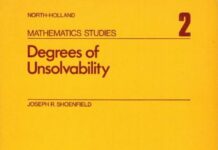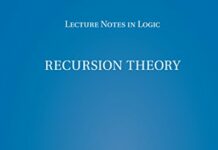
Ebook Info
- Published: 2001
- Number of pages: 352 pages
- Format: PDF
- File Size: 8.78 MB
- Authors: Joseph R. Shoenfield
Description
This classic introduction to the main areas of mathematical logic provides the basis for a first graduate course in the subject. It embodies the viewpoint that mathematical logic is not a collection of vaguely related results, but a coherent method of attacking some of the most interesting problems, which face the mathematician. The author presents the basic concepts in an unusually clear and accessible fashion, concentrating on what he views as the central topics of mathematical logic: proof theory, model theory, recursion theory, axiomatic number theory, and set theory. There are many exercises, and they provide the outline of what amounts to a second book that goes into all topics in more depth. This book has played a role in the education of many mature and accomplished researchers.
User’s Reviews
Editorial Reviews: Review ” “”classic text is as fresh and useful today as when first published. Noted for the economy of its presentation, it includes a wealth of basic and key results from all parts of mathematical logic.”” -Solomon Feferman, Stanford University, January 2001 “”The book remains an excellent introduction to logic . . . reads as a continuous whole, not a set of isolated topics . . . “” -C. W. Kilmister, The Mathematical Gazette, July 2003″
Reviews from Amazon users which were colected at the time this book was published on the website:
⭐In 1982 the students in Dr Grove’s 618-341 then University of Melbourne Mathematical Logic third year lecture course were given the unenviable task of borrowing one by one a single copy of this classic text from the library. In my turn, I spent a week browsing it trying to make sense of it all! Now, of course, this would be unnecessary, in that the Association for Symbolic Logic have had it brought back into print! Great work folks!In that week I made heavy weather of the text. The material ranges from third year introductory topics to advanced conjectures that are merely relevant to the doctoral student! Even to the topic of large cardinals … relevant to the existence of a consistent theory of the hyperreal system proposed by H. Jerome Keisler …As someone inclined to Mathematical Platonism with my beliefs that the real numbers really exist and that in this universe the laws of physics express these real numbers … I have a contempt for finitistic theories of mathematics … and this means that, in considering the situational logic of set theory as described in chapter nine, I have an appreciation of the proven problem of the non existence of the set of all sets, with the implication that in some deep sense the sets must therefore exist in some series of Platonic spheres in another realm … accessible by contemplation by our brain singularities’ intuition … wherein there is the theory expressed in an existent model of Peano’s Laws Of Arithmetic (chapter eight), based on which in turn there exists a model of the real numbers … the argument from the Dedekind Cuts proving the existence thereof … in some sort of hierarchical Russellian type theory … Mathematical Platonism: The True Nature Of Reality!More recently physicists have been reexamining the old questions … their phrases bring back memories … computational nature of reality … the cellular automata finitistic unverse?? … OR … a universe based on the real numbers??
⭐Too many typos.example 1: some symbols are supposed to be bold (because they are syntactical variables) are not corrected made bold and the some symbols are supposed to be not bold are incorrectly made bold.example 2: the mathematical symbol that means “∃” was incorrectly typed as 3, clearly the person who typed it had no idea what he/she was doing.I won’t list all the typos. I spent 46.49 dollars on an ebook and I expect better quality, especially when the book is on such a rigorous subject. Kindle didn’t do a good job.
⭐Almost four decades after being written, this is still the standard graduate survey text. A large part of the reason is that there is little competition, but it is also a good book on its own merits. The author writes with a clarity and concision you rarely see in a math (or any) textbook. Proofs are straighforward, not tricky or convoluted. There are many excercises and with detailed setup. The exercises are often quite hard, requiring significant extension from the text.Although the writing is good, that doesn’t mean it is easy. He progresses deliberately through the details, rarely giving an overview. I think he is just expecting that you already have a good sense of context from the undergrad logic course you took (didn’t you?). Sometimes he seems to belabor a point. There is also a dearth of examples, just five in the whole book, three of them in the appendix. There are no references at all. The age of the book makes it, not wrong, but inadequate in some areas. Still, I have looked at alternatives and haven’t found something better for a graduate survey text in English.
⭐When I get confused by the other 30 mathematical logic books on my bookshelf, I seek refuge in this “Mathematical Logic” book by Joseph R. Shoenfield. It is clear and systematic in what it covers.Two other reviews explained the strong points of this book very well. I would just like to agree particularly that the presentation of the constructible universe model for ZF is excellent. The explanation in this book is significantly better than explanations in other books, both earlier and later than the 1967 date of publication. It is interesting to compare Shoenfield’s constructible universe (pages 270–281) with two briefer presentations of it in ”
⭐” by Paul Cohen. The Shoenfield “construction” maps the ordinal numbers to the constructible universe. This has the advantage that you only have to accept the existence and properties of ordinal numbers in order to create a set-universe for the model, whereas some other constructions start with the von Neumann universe V and choose elements of that universe to represent constructible sets (by restricting sets in V). Building up the universe from ordinals seems to me much better than pruning back the more metaphysical von Neumann universe. (That’s just my personal bias.)Shoenfield gives some presentation of Paul Cohen’s forcing method for ZF models and the consequent independence proofs (pages 282-303), but otherwise he gives little coverage to the bewildering menagerie of ZF models which appear in ”
⭐” by Howard and Rubin, and the interesting menagerie of models in ”
⭐” by Jech.The typesetting is excellent, the paper is bright white, and the binding is good. The notations and definitions are modern.
⭐Es un libro que ya no se edita, por lo que la única opcion es domorarlo de segunda mano.El estado perfecto.El tiempo de envío es algo largo para lo que uno está acostumbrado en Amazon, pero no se retrasa más de lo qje te avisa en el momento de la compraSobre el libro…ni ideaEs para mi hijo que estudia la carrera de Matematicas.Según él, muy buen libro para los interesados especialmente en la parte más abstracta de la lógica matemática ♀️Il libro è veramente in ottimo statoQualche giorno di ritardo sul previsto, ma ci sono state le feste di Natale, penso sia normaleI am not a professional mathematician, in the strict sense of the words, but just an IT-standard developer who needs some knowledge about mathematical logic, but I always use this book as a basic reference. In particular, for selecting an exact word for scientific papers or standards in ontology related area, the book is very useful and gives a good perspective. I would buy this book again, if it is published in Kindle or any other electronic form.
⭐タイトルは「数理論理学」だが、内容は論理学のみならず、モデル理論、再帰関数論、集合論(含強制法)という、数学基礎論(ほぼ)フルコースといった趣き(もっとも向こうで「ロジック」といえば基礎論のことなので、まあ別にこのようにいいたてることもないのですが・・・)。叙述も簡にして要を得たもので、初学者にも薦められる。とにかくあると安心。この値段でも決して高くない。裏表紙にあるvan den Driesの”Studying this book and doing the exercises made me a logician”という文言も納得な一冊。
Keywords
Free Download Mathematical Logic (Addison-Wesley Series in Logic) 1st Edition in PDF format
Mathematical Logic (Addison-Wesley Series in Logic) 1st Edition PDF Free Download
Download Mathematical Logic (Addison-Wesley Series in Logic) 1st Edition 2001 PDF Free
Mathematical Logic (Addison-Wesley Series in Logic) 1st Edition 2001 PDF Free Download
Download Mathematical Logic (Addison-Wesley Series in Logic) 1st Edition PDF
Free Download Ebook Mathematical Logic (Addison-Wesley Series in Logic) 1st Edition

